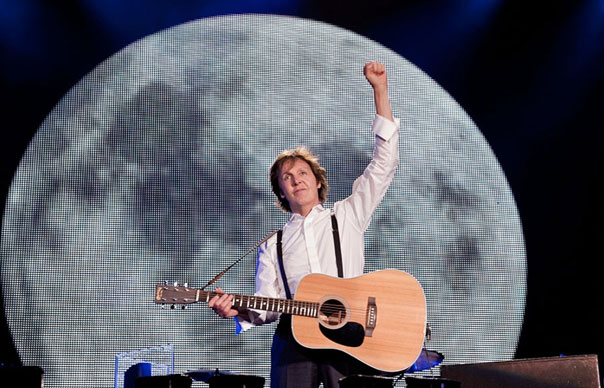Writing songs seemed to come easy to you and John.
“Not so much easily as quickly. It was out of necessity as much as anything. We’d sag off school and write songs at my house. We’d start at two in the afternoon and we had to be finished by five so we could clean up and clear out before my dad got home. We wrote loads of stuff. We’d stuff some Twinings tea in a pipe, smoke that and write songs. It wasn’t all good. But we always came up with something. In all the years I wrote with John, I can’t remember a single occasion when we didn’t come up with a song. At worst, we’d write at least one every day. It all happened at an amazing pace. Because it had to. When we came to record the first Beatles album [Please Please Me], we did it in a single day because that’s all the time there was. That’s how things were done in those days. The studio was booked for one day. We went in at 10 in the morning, played our live set all the way through, then we went home. The following day, we had two gigs to do. There was no time for messing about. It’s great when you do it like that. It’s quite magical, really. You just grab hold of stuff. Your driver says, ‘Have I been busy? I’ve been working eight days a week, mate.’ And you think, ‘Hello, that sounds like a song title.’ So you write it, filling in from the title.”
Did you see The Beatles differently from John Lennon?
“Hmm. I don’t think so. We all had a common vision, at least in the early days. Then everyone seemed to think that we wanted to go in different directions. But I’m not even sure that’s true. The thing about me and John is that we were different, but we weren’t that different. I think Linda put her finger on it when she said me and John were like mirror images of each other. Even down to how we started writing together, facing each other, eyeball to eyeball, exactly like looking in the mirror. That’s how songs like ‘I Want To Hold Your Hand’ were written.”
You were like two sides of the same person?
“Well said. But the sides would switch. On the surface, I was very easy-going, always accommodating. That came easy to me. That’s how I’d been brought up. But, at certain times, I would very much be the hard man of the duo. At certain moments, I could bite. But that would be when no one outside the group was watching. John would allow me to take that role because it enabled him to drop his guard and be vulnerable. On the surface, he was this hard, witty guy, always on hand with a cutting witticism. He appeared caustic, even cruel at times. But really he was very soft. John was very insecure. He carried a lot of that from his upbringing, what with his father leaving when he was five. Then, of course, we’d both lost our mothers so we had that in common. Ultimately, we were equals. All The Beatles were equals. If things got too deep, Ringo would crack a one-liner and that kept us on a level. If things were getting too sentimental, John would harden it up. If John was getting too hostile, I’d soften it down. Then George was always on hand with his own kind of unique wisdom.”
How competitive were you and John?
“There was amazing competition between us and we both thrived on it. In terms of music, you cannot beat a bit of competition. Of course, there’s times when it hurts, and it’s inevitably going to reach a stage where it’s hard to live with. Sooner or later, it’s going to burn itself out. I think that’s what happened at the end of The Beatles. But, for those early years, the competition was great. It was a great way for us to keep each other on our toes. I’d write ‘Yesterday’ and John would go away and write ‘Norwegian Wood’. I’d come up with ‘Paperback Writer’ and John would come back with ‘I’m Only Sleeping’. If he wrote ‘Strawberry Fields’, it was like he’d upped the ante, so I had to come up with something as good as ‘Penny Lane’.”
On the subject of “Yesterday”, does it surprise you that as many people violently hate that song as love it?
“My personal take on it is that it’s not a bad little song. Whether it’s the most popular or whatever, it’s certainly loved by quite a few people. When you get a song like that, whether it’s ‘Yesterday’ or ‘I Will Always Love You’, a lot of people will react against it. Because it’s always on the radio or at the top of the chart or always playing in restaurants, some people will get annoyed having to listen to it. It’s a bit of a British thing, that. We Brits are not that big on success, especially when someone else is having it [laughs].”



